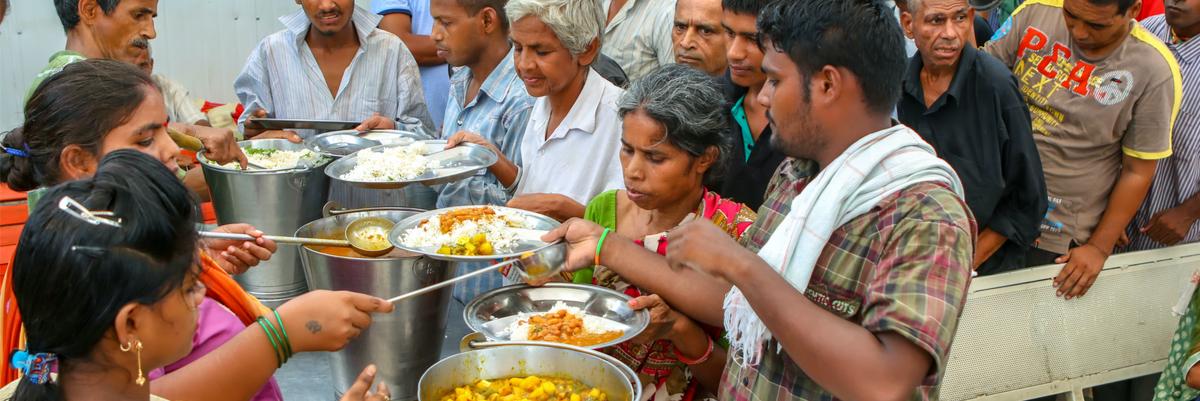The Supreme Court on Friday asked all states and Union Territories (UTs) to file replies in response to a Public Interest Litigation (PIL) that seeks directions for setting up of government-funded community kitchens to combat hunger, malnutrition and starvation deaths in the country.
Justice NV Ramana who was sitting along with Justice Sanjiv Khanna on the bench conceded that the proposed kitchens were very much needed.
The Attorney General for India (AG) KK Venugopal who was appearing for the Union Government also agreed with Justice Ramana.
Petitioners Anun Dhawan, Ishann Dhawan and Kunjana Singh told the apex court that the Right to Food is a fundamental human right well recognized under national and international law, which protects the right of people to access food.
“The right to food is interlinked to one’s right to life and dignity and requires that food be available, accessible and adequate for everyone without discrimination or any inequality. Therefore, unavailability and lack of accessibility of food with adequate nutrition is thereby violative of Articles 14, 21, 38, 39, 47 and 51(c) of the Constitution of India,” the petitioners have stated in their plea.
Citing 2017 National Health Survey (NHS), petitioners have informed the court that approximately 19 crore people in the country are compelled to sleep on an empty stomach every night.
The petition has stated that approximately 4500 children die every day under the age of 5 years in the country due to hunger and malnutrition, amounting to over 3 lakh deaths every year.
Additionally, it has noted that 7000 persons (including children) reportedly die of hunger every day and over 25 lakh persons (including children) die of hunger, annually.
The petition also draws attention of the court to a fact that while there are statistics available for malnutrition deaths of children and adults in the country, there is no official data available for death of persons owing to starvation.
It goes on to add, “the irony of the present situation is reflected by a group of activists reported 56 deaths owing to starvation between 2015-2018, out of which 42 deaths took place between 2017-2018; while 25 of the 42 deaths were solely related to non-linking of Aadhaar with Ration Card or loss of Ration Card, with the highest deaths recorded in Jharkhand and Uttar Pradesh.”
Referring to the Global Hunger Index 2018 report prepared by Concern Worldwide and Welthungerhilfe, the petition has pointed out that the study has ranked India at 103 out of 119 countries.
“India scored 31.1, indicating that it suffers from a level of hunger that is critical and serious. Pursuant to a global comparison, the Food and Agriculture Report, 2018 stated that India houses 195.9 million of the 821 million undernourished people in the world, accounting for approximately 24% of the world’s hungry,” petition has claimed.
Relying upon the report of PRS Legislative Research, petitioners have also submitted that the malnourishment is prevalent in the country even among adults as 23% of women and 20% of men are considered undernourished in India.
Additionally, the petition has maintained that “the Ministry of Women and Child Development, Government of India in a press release admittedly stated that malnutrition is not a direct cause of death but contributes to mortality and morbidity by reducing resistance to infections. There are a number of causes of death of children such as prematurity, low birth weight, pneumonia, diarrheal diseases, non-communicable diseases, birth asphyxia & birth trauma, injuries, congenital anomalies, acute bacterial sepsis and severe infections.”
Petition also referred to concept of state-funded community kitchens running in some parts of the country. For instance, the petitioners cite example of States such as Tamil Nadu (Amma Unavagam), Rajasthan (Annapurna Rasoi), Karnataka (Indira Canteens), Delhi (Aam Aadmi Canteen), Andhra Pradesh (Anna Canteen), Jharkhand (Mukhyamantri Dal Bhat) and Odisha (Ahaar Centre) which have been established with the same object of combating hunger and malnutrition crisisin the nation, providing nutritious food at subsidized rates to the lowest socio-economic strata of the society.
The petitioners have submitted before the apex court that the implementation of government run community kitchens or community kitchens managed with funding from the State as well as under Corporate Social Responsibility (u/s 135 of the Companies Act, 2013 r/w Schedule VII of the Constitution of India by a Public-Private Partnership (PPP), could be implemented to complement the existing schemes.
These models of community kitchens, according to the petitioners, could bring an end to malnutrition and starvation deaths, providing employment to many for running these kitchens.
The following relief has been sought by the petitioners from the top court:
- Direction to the Chief Secretaries of all the states and UTs to formulate such scheme to implement the concept of community kitchens to combat hunger, malnutrition & starvation and deaths resulting thereof, and to further ensure that no person should sleep on an empty stomach.
- Direction to the National Legal Services Authority to formulate a scheme in order to further the provisions of Article 51A of the Constitution of India in order to mitigate deaths resulting from hunger, malnutrition and starvation.
- Direction to the Central Government to create a national food grid for those persons beyond the scope of the Public Distribution Scheme.
Earlier, the court had issued a formal notice in the matter on September 2, 2019. The matter is listed for next hearing on November 26, 2019.





